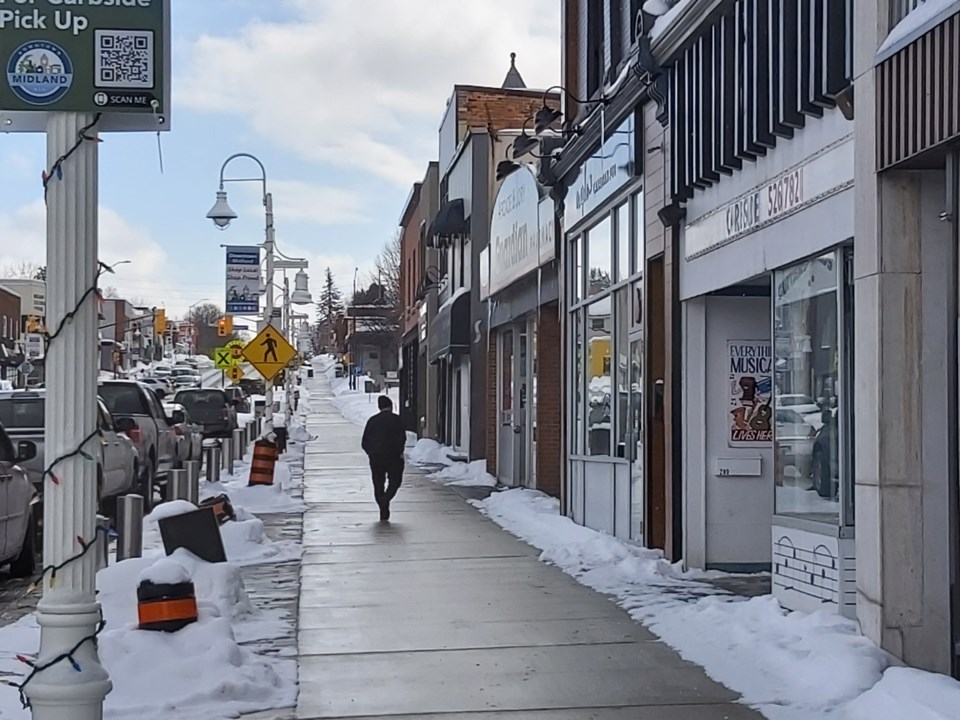It’s high time the local homeless and, in turn, the Guesthouse Shelter stopped being thrown under the bus, Midland’s mayor says.
“The general belief seems to be that the safety concerns relate primarily to homeless guests of the county-funded shelter that operates in our downtown core," Bill Gordon tells MidlandToday.
“In addition, there seems to be a belief that the shelter should bear some or all responsibility for their guests once they leave the shelter during the day.”
The issue has been coming to a head of late as a result of comments made by Coun. Sheldon East at a recent meeting and words attributed to a former downtown businessman who says he left the downtown because of vagrancy and safety concerns.
The general consensus from some residents and store owners, including East who noted the homeless are "terrorizing downtown," seems to be that the Guesthouse should be responsible for the conduct of its clientele when they’re not at the shelter.
“Of course, this belief is baseless and if true would see our hotel operators liable for the activities of their guests when off their property, or any of us liable for actions of adults who reside with or stay with us in our homes,” Gordon said.
“However, when people get angry or afraid, emotions tend to overshadow critical thinking.”
Responding to criticism that the local homeless shelter isn’t doing enough to ensure public safety in the downtown core, Gordon has been on a bit of a fact-finding mission.
To get a better understanding of the situation, funding and operational challenges, Gordon’s meeting with Mina Fayez-Baghat, general manager of social and community services division at the County of Simcoe, and his team as well as with Guesthouse Shelter CEO Nathan Sykes and a couple of the facility’s board members.
“In addition, I have been receiving reports from the community, at least two of our councillors and members of the BIA about safety concerns with the downtown core and concerns about homelessness,” Gordon says.
Gordon says without "pretending" to be able to solve chronic homelessness or its root causes such as combinations of poverty, untreated mental health issues and drug addiction, there is a role for a municipal government and the community to play in helping to manage the symptoms.
“Denial has no place in this discussion as we can all agree the problem is here, on an economy of scale, just as it is in most downtowns across the continent,” Gordon says.
“While the funding for the support services to help manage homelessness, addiction and mental health flow through the province and County of Simcoe, the municipality and our residents can help, both financially and with empathy for those less fortunate or for whom life’s challenges are not manageable without supports and interventions.”
Gordon says that as part of the county’s funding for those experiencing homelessness or are going through a transition, funds are provided to outreach services, homeless shelter and motel voucher programs throughout Simcoe County including not only the Guesthouse, but also the Salvation Army (outreach), Huronia Transition Homes (women’s shelter) and Shelter Now (supportive and transitional housing and rent supplements).
Gordon says that after speaking with Sykes, one gap in service delivery which is affecting many non-profits nowadays is a “crippling” lack of volunteers post-COVID along with an inability to attract staff to fill all their shifts.
“As a 24/7 shelter, evening and overnight staff are mission critical,” Gordon says. “The gap is attracting staff that can work days to keep the shelter open, provide an alternative to ejecting their guests early in the morning and leaving them to fend for themselves all day, without access to washrooms or support services that would normally work at the shelter if it were open, and resulting in the sleeping-bag clumps of homeless people often seen downtown near the shelter or in alleys.”
During the three temperate seasons, this results in tent encampments, according to Gordon, who pointed out these issues could be solved with a combination of additional funds to offer more competitive wages, which is happening in other sectors to attract an elusive pool of jobseekers.
As it stands now, 60% of the shelter’s operational funding comes with the balance coming from private donations through bequests, grants and yearly fundraising like Coldest Night of The Year.
So far, the local effort features 91 walkers, 18 teams and six volunteers who plan to help out during the Feb. 25 event. As of Thursday afternoon, $14,350 of the $39,000 goal has been reached with funds going to the Guesthouse.
With that in mind, Gordon has formed his own team to raise funds for the shelter during the Coldest Night event with a $5,000 goal.
Gordon also noted the Coldest Night fundraiser isn’t about expanding services, but rather help the shelter open for longer hours and offer daytime access that allows its clients to stay out of the cold, get access to services that rely on the building being open during business hours, and use the washrooms.
“I am asking for the community’s help to reach this goal and with my pledge that I will continue to work with council, the county, the BIA and the Guesthouse to deal with acute issues within our control as well to push for more housing to be built in Midland to help with the supply/demand ratio inequity that can contribute directly to homelessness.
“Affordable housing is a priority but the costs to the municipality based on Bill 23 and how the province will make good on their promise to help cover the funding shortfalls that result from their new legislation, remain elusive.”



